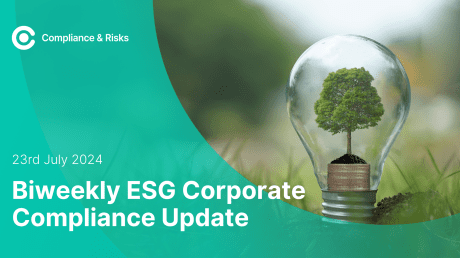
What’s Trending In Compliance? (June 2022)

At Compliance & Risks we help manufacturers, retailers and their supply chain partners to monitor and manage global regulations via C2P, our compliance knowledge management platform.
These are some of the top trending topics that generated the most interest in the last month.
1. India: E-Waste (Management), Draft Rules, S.O. 360(E), May 2022
On 19 May 2022, the Indian Ministry of Environment, Forest and Climate Change proposed the Indian E-Waste (Management) Draft Rules.
The rules apply to manufacturers, producers, refurbishers and recyclers of electrical and electronic equipment listed in Schedule I, including their components and spare parts.
These entities are subject to the obligations set out in the text such as registration, e-waste collection and reporting.
The proposed rules also restrict hazardous substances in electrical and electronic equipment to ensure that such equipment does not contain lead, mercury, hexavalent chromium, polybrominated biphenyls and polybrominated diphenyl ethers beyond a maximum concentration value of 0.1% by weight in homogenous materials, and of 0.01% by weight in homogenous materials for cadmium.
The Draft Rules are intended to supersede E- Waste (Management) Rules, 2016.
The deadline for comments on this Draft is 18 July 2022 and the comments can be submitted via email to mishra.vp@gov.in or vinodsingh.77@gov.in.
2. Spain: Packaging and Packaging Waste, Draft Royal Decree, September 2021
On 6 May 2022, the Spanish Ministry for Ecological Transition and Demographic Challenges notified the EU Commission of a modified version of the Draft Decree for packaging and packaging waste.
The new version of the Draft differs inter alia from the previous version as follows;
- Extended Producer Responsibility requirements are extended to commercial and industrial packaging, so that all product producers must have an individual or collective system to finance the costs of collection, management and treatment etc;
- Reduces objectives for the reuse of packaging in the HORECA channel (i.e. for hotels, restaurants and cafeterias);
- Deadlines are established for prohibiting the packaging of whole fresh fruits and vegetables weighing less than 1.5 kg;
The standstill period for the Draft ends on 8 August 2022, however, it is advisable to submit any comments one month prior to this deadline, as per EU Commission recommendations.
If approved by the EU Commission, it is anticipated that the Spanish Government will approve the Royal Decree in the Council of Ministers.
Once enacted Spain will be in compliance with the EU’s Plastics Directive and will have implemented the Spanish Law on Waste and Contaminated Soil for a Circular Economy (7/2022), which establishes mandatory minimum requirements within the framework of extended producer responsibility.
3. Canada: Prohibition of Certain Toxic Substances, Draft Regulations, May 2022
The Canadian Governor in Council pursuant to CEPA has proposed draft regulation on the prohibition of certain toxic substances.
Subject to certain exemptions the manufacture, use, sale and import of PFOS, PFOA, LC-PFCAs, HBCD, PBDEs, DP, and DBDPE will be prohibited. The exemptions being proposed take into account technical and economic factors, the demonstrated absence of suitable alternatives, and consideration of the international context and risks to the environment.
The proposed Regulations also aim to simplify the current regulatory text by consolidating all substance-specific exemptions into one schedule and clarifies that the clauses allowing the continued use and sale of products found in Canadian inventory are only for those products that were imported or manufactured in Canada before the coming into force of the final Regulations.
4. France: Circular Economy Information to be Reported from Extended Producer Responsibility Sectors, Draft Order, June 2022
The Circular Economy Law No. 2020-10 introduced a number of articles to the environment code that require the Extended Producer Responsibility (EPR) sectors to report various information.
More specifically, Articles L. 541-10-13 and L. 541-10-14 of the environment code require producers of the products subject to EPR under L 541-10 (for example EEE, batteries, textiles, packaging etc.) to annually send information to the French Environment and Energy Management Agency (ADEME).
Article L. 541-15-2 (also introduced through the Circular Economy Law) provides that the eco-organizations or individual producer schemes must annually send information on their activities to the competent authority responsible for the development and monitoring of the regional plan for the prevention and management of waste (PRPGD) or the regional planning, sustainable development and territorial equality plan (SRADDET).
The objective of this draft order is to set out the detailed information to be reported by producers and eco-organisations for each of their sectors subject to EPR.
The information must be sent by 31 March annually to ADEME and by 30 June annually to the competent authorities responsible for development and monitoring of the PRPGD or SRADDET.
It also lists the information that will be made available to the public by ADEME, as well as by the eco-organisations.
The draft order contains 15 annexes which detail by EPR product sector the information that must be sent.
The draft proposes to repeal a number of specific decrees containing provisions relating to previous information to be reported for each EPR sector.
Producers who market small quantities of products, and who benefit from paying a financial contribution in the form of a flat rate pursuant to the last paragraph of Article R. 541-119, are eligible for a simplified declaration.
Interested stakeholders may submit their comments on this draft proposal until 15 July 2022.
5. Thailand: Determination of Types of Products to be Label-Controlled Products, Announcement, May 2022
On 23 May 2022, the Thai Chairman of the Board on Labelling issued an Announcement on the Category of Labelling Controlled Products, in accordance with the Notice on Characteristics of the Label on Label-Controlled Goods (B.E. 2541, 1998).
In order to protect consumers by allowing them to obtain accurate and complete information about the product, some goods are assigned as label-controlled goods in Thailand.
This Announcement provides the aforementioned list, and includes, but is not limited to, the following categories:
- Household products
- Personal products
- Paper products and stationary
- Electrical appliances and components (electric kettle, coffee machine, blender, food mixer, image screen, computer equipment, radio receivers, audio equipment, microphones, speakers, lamps (not including medical lamps), freezers (excluding medical freezers) electric stove, microwave ovens, electric iron, LED lamps)
- Vehicles and equipment
- Agricultural equipment
- Construction materials
- Other (e.g. sewing machines, mobile phones, watches, batteries used for watches, calculators or cameras).
This Announcement will come into force on 21 August 2022, 90 days after its publication.
Stay Updated On Global Regulations
This information is based on the most viewed regulations on C2P this month. If you would like to find out more about how you can stay on top of global regulations, why don’t you Book a Demo with our team today?
Book Time With Our Team
Learn how C2P can help you stay ahead of regulatory changes and achieve uninterrupted market access.








